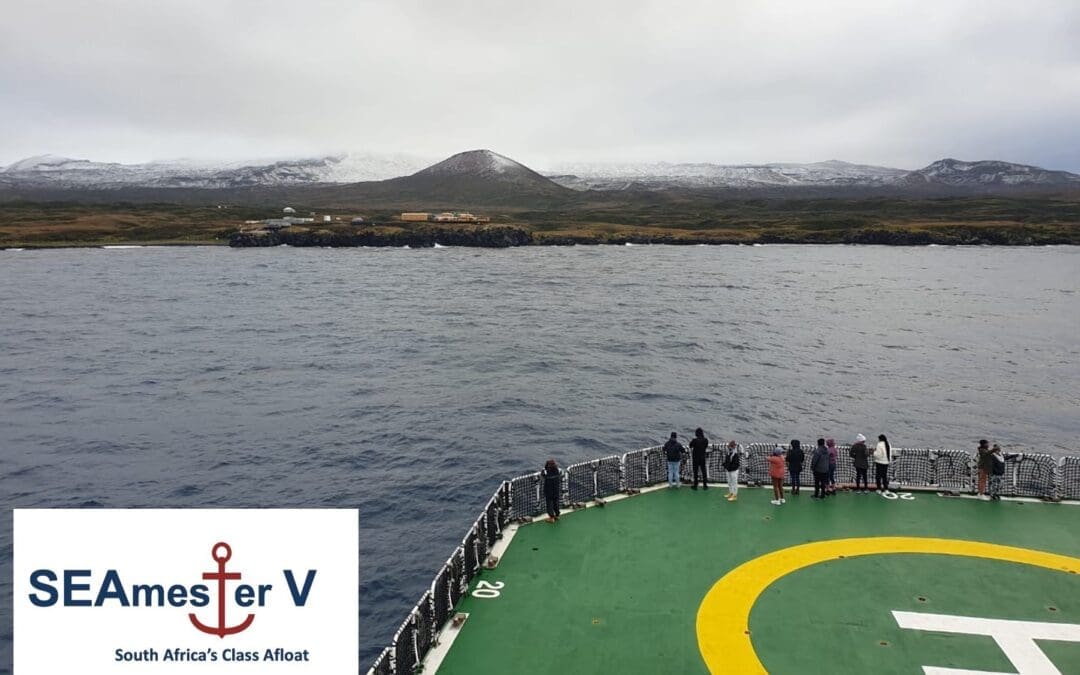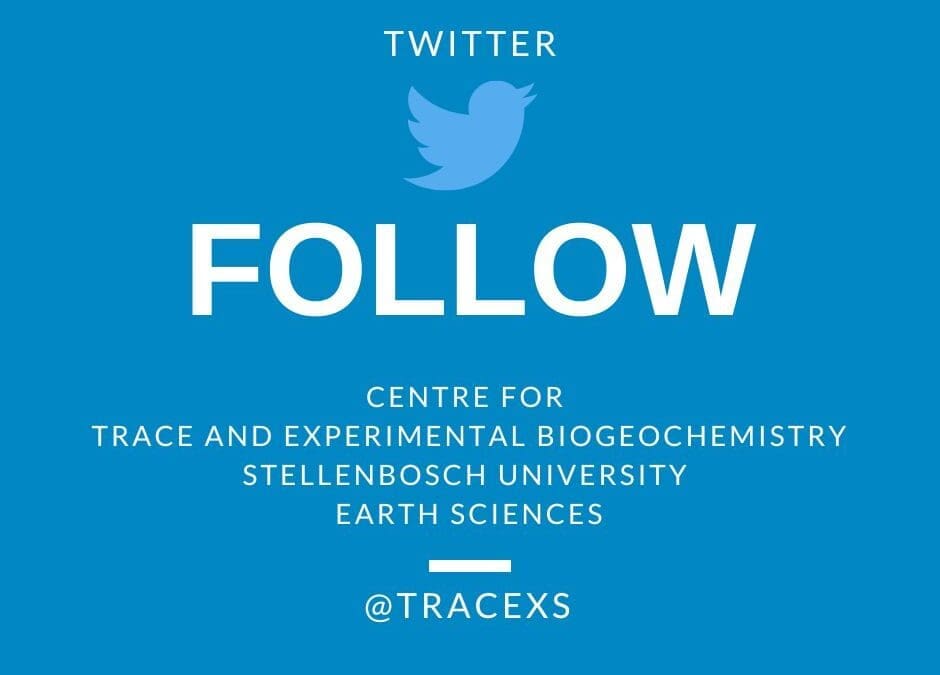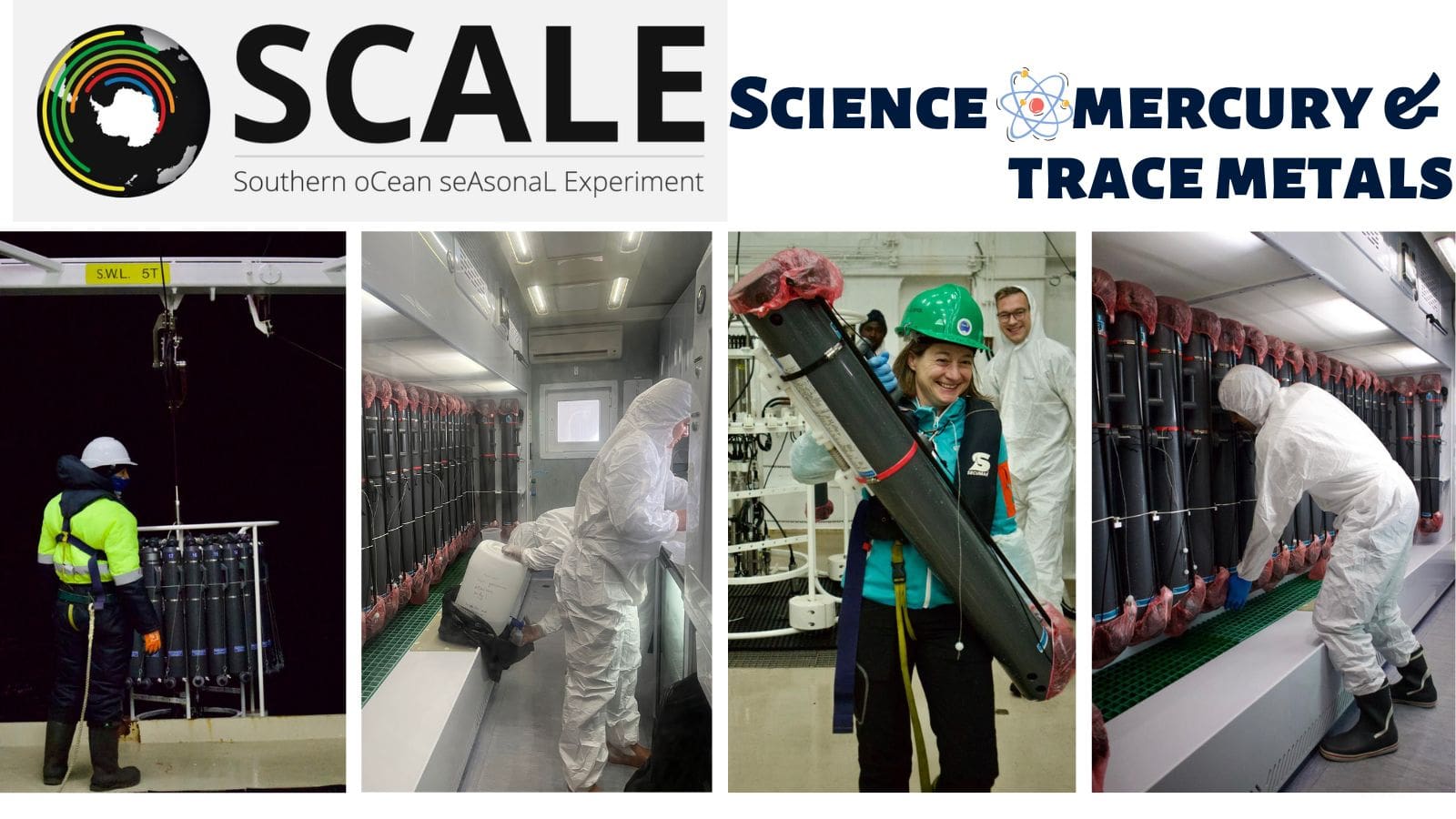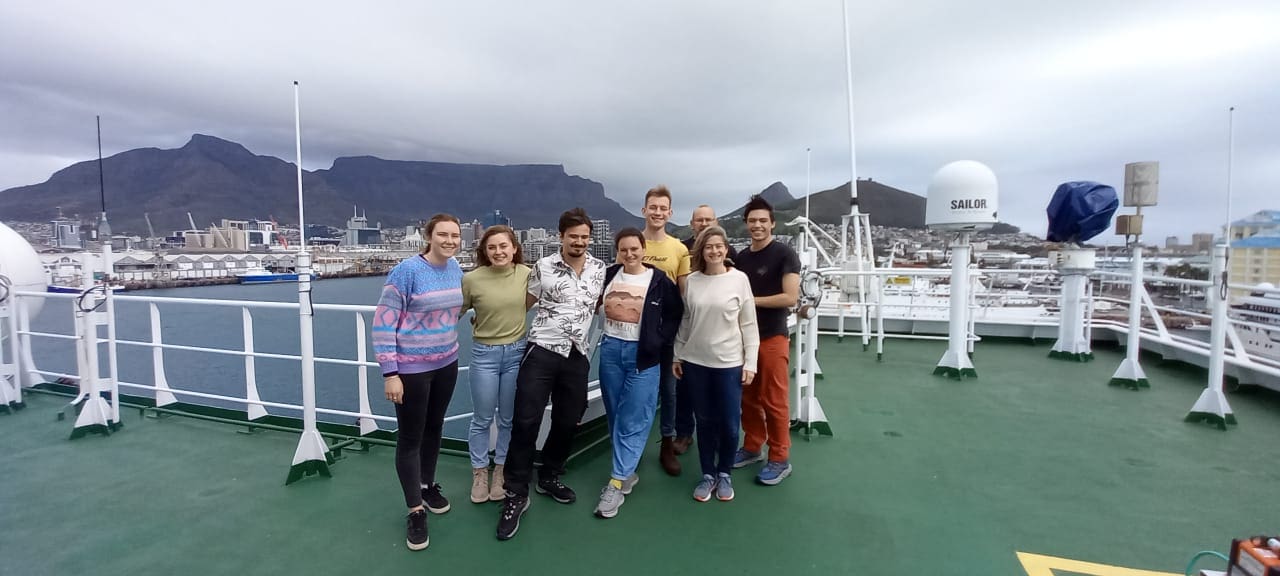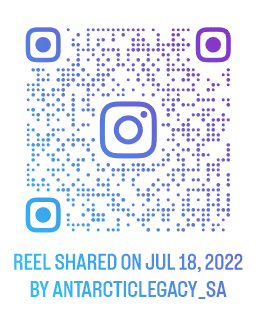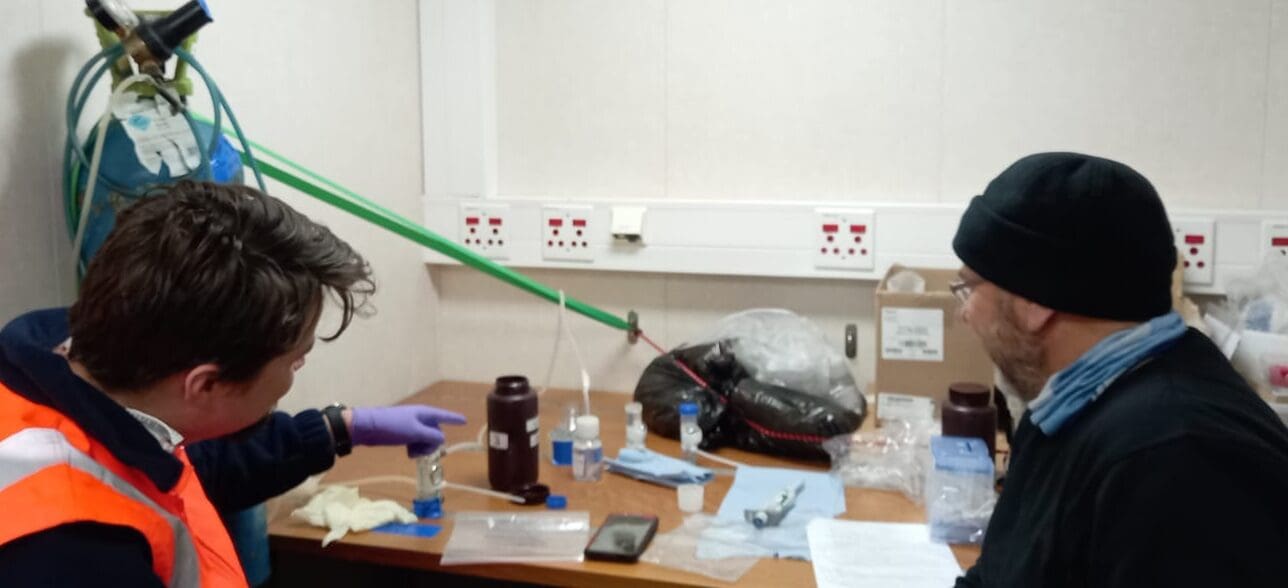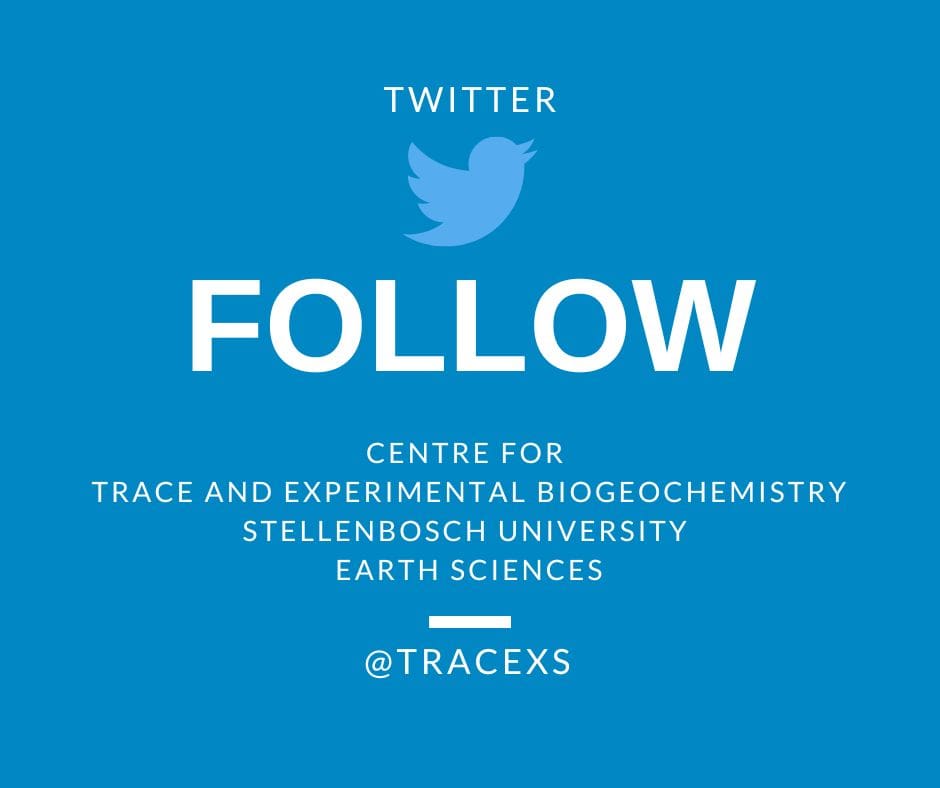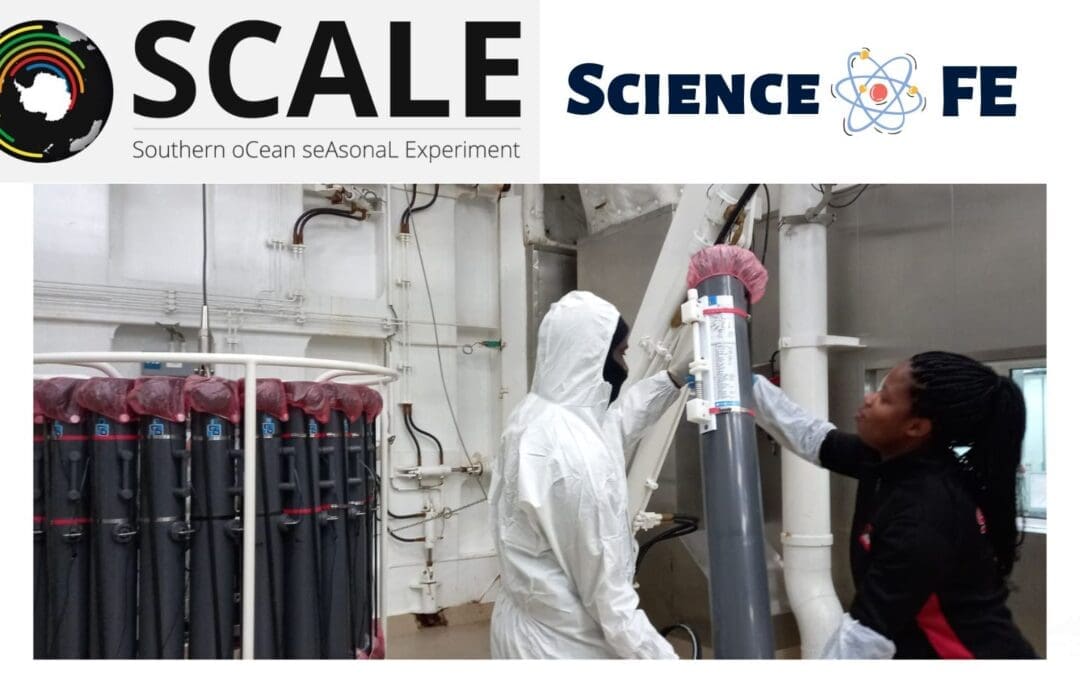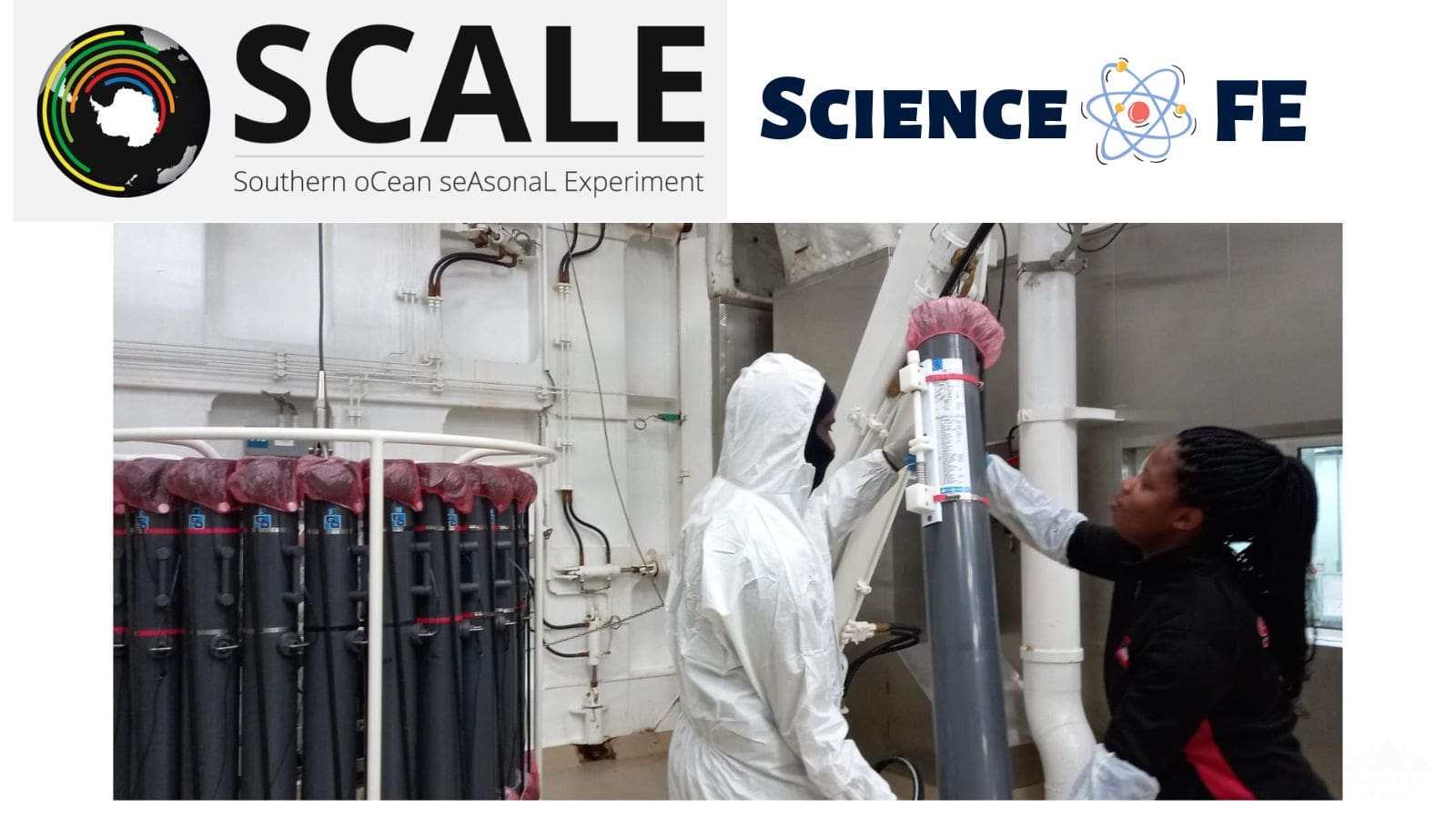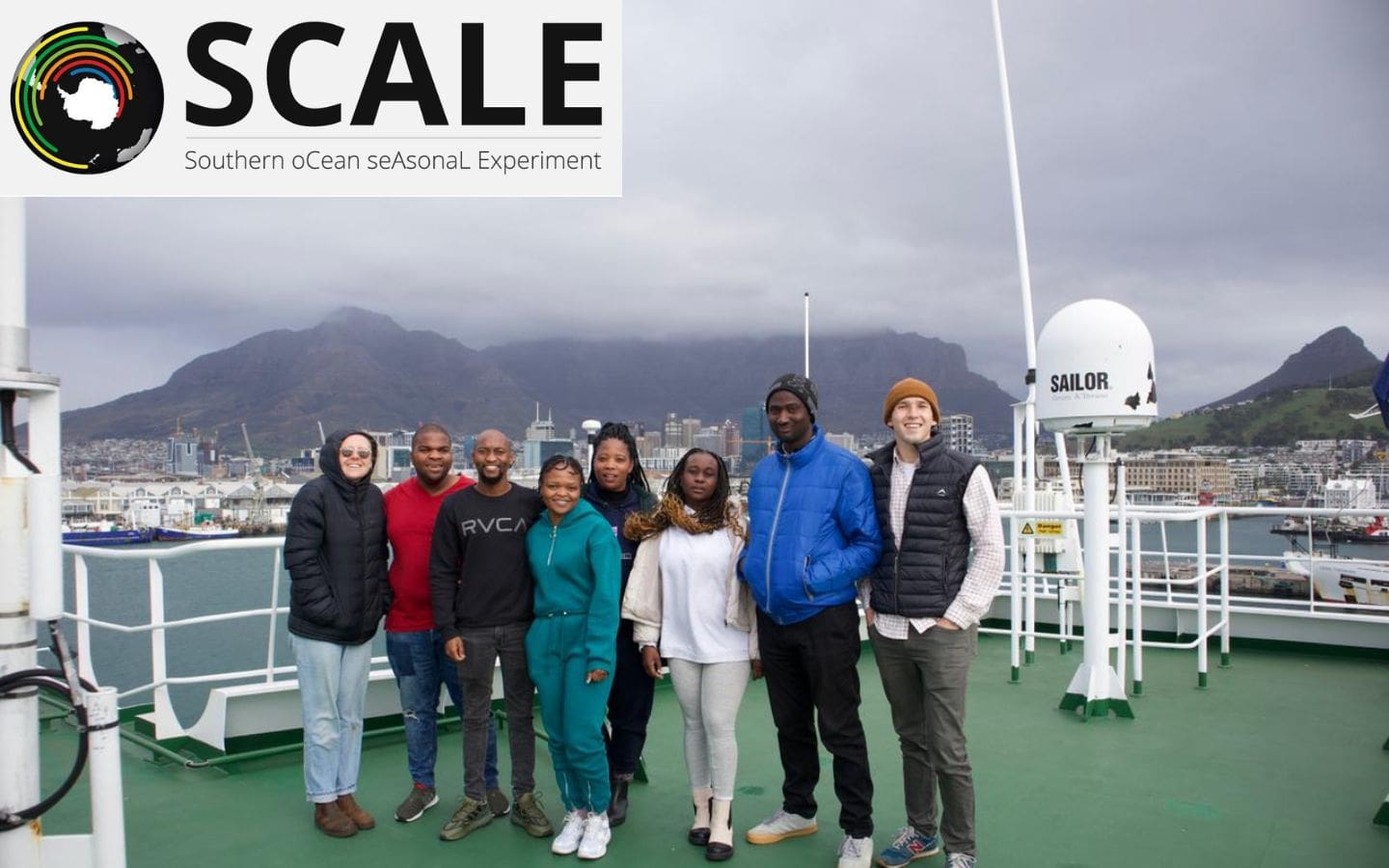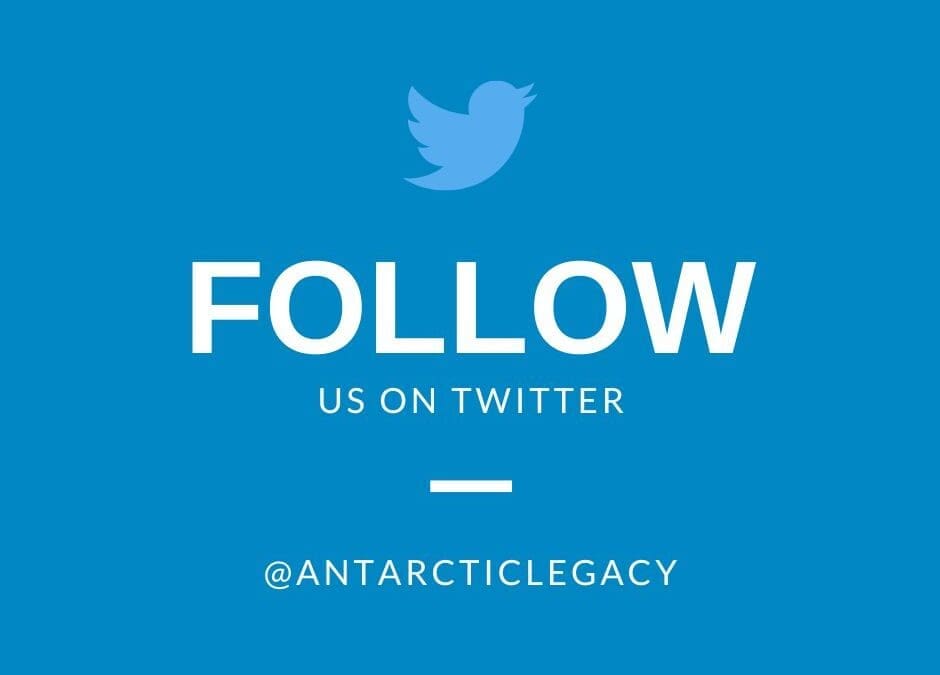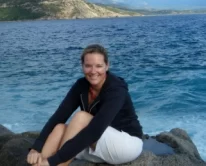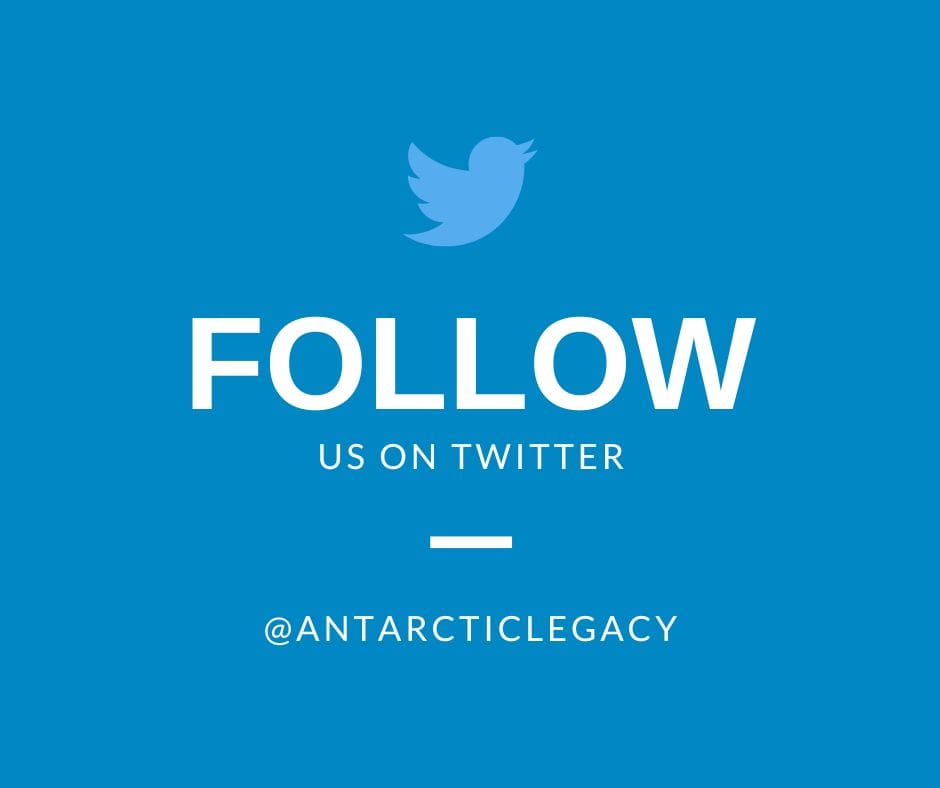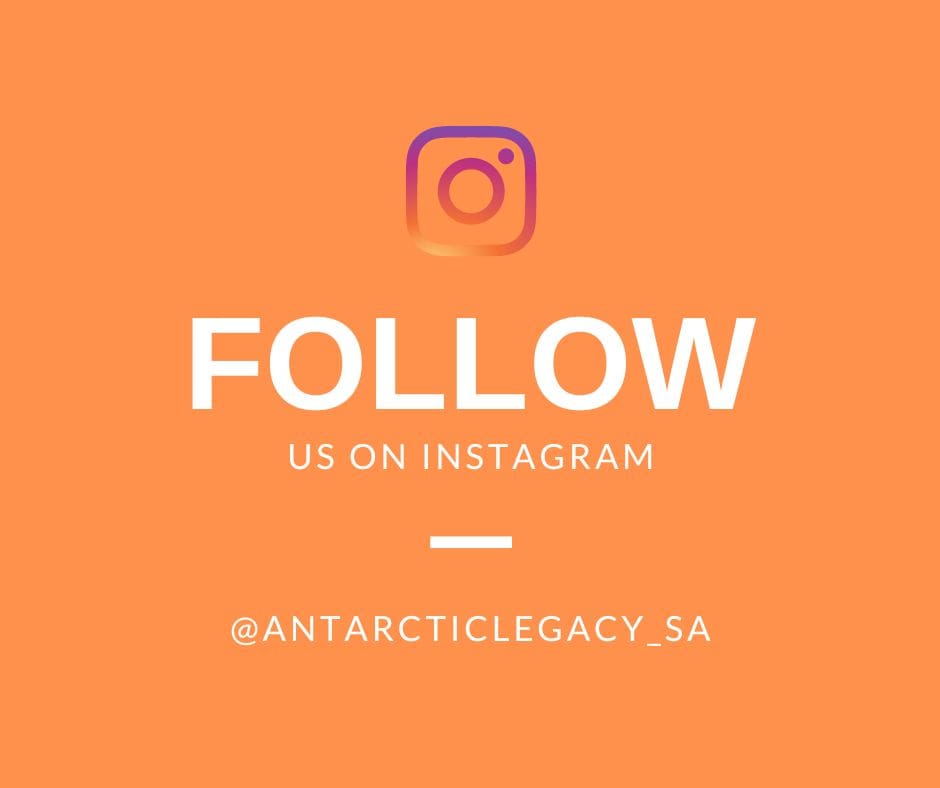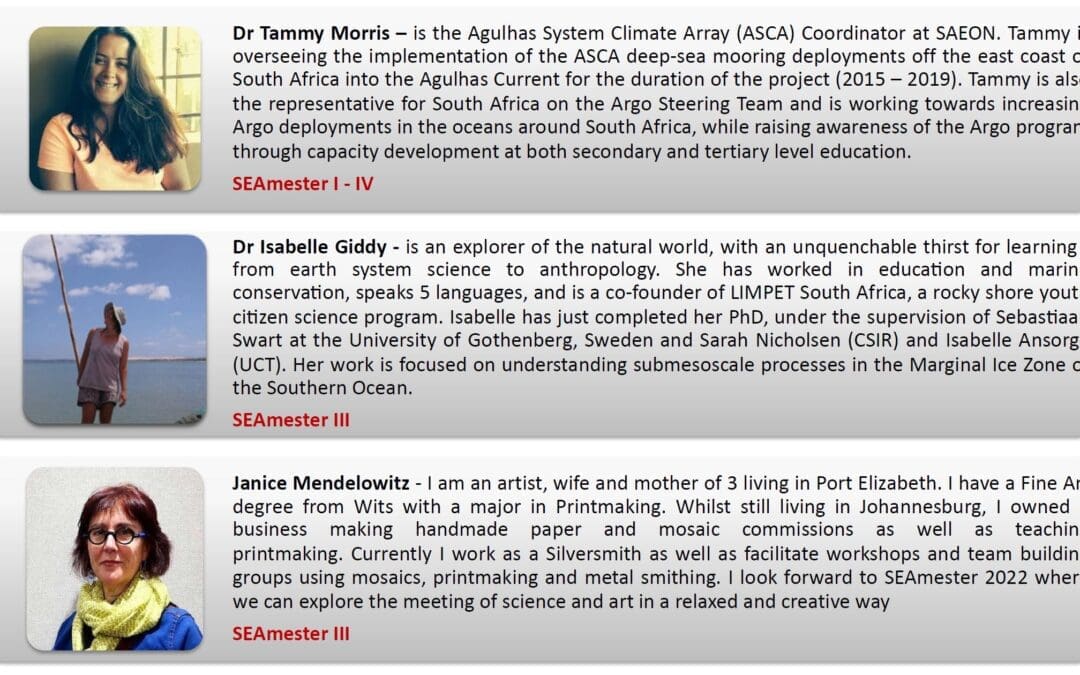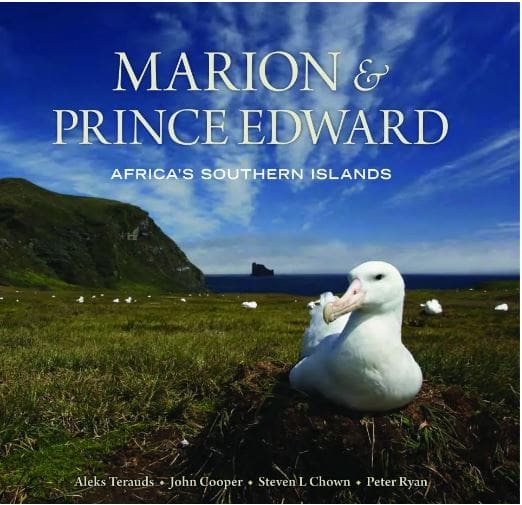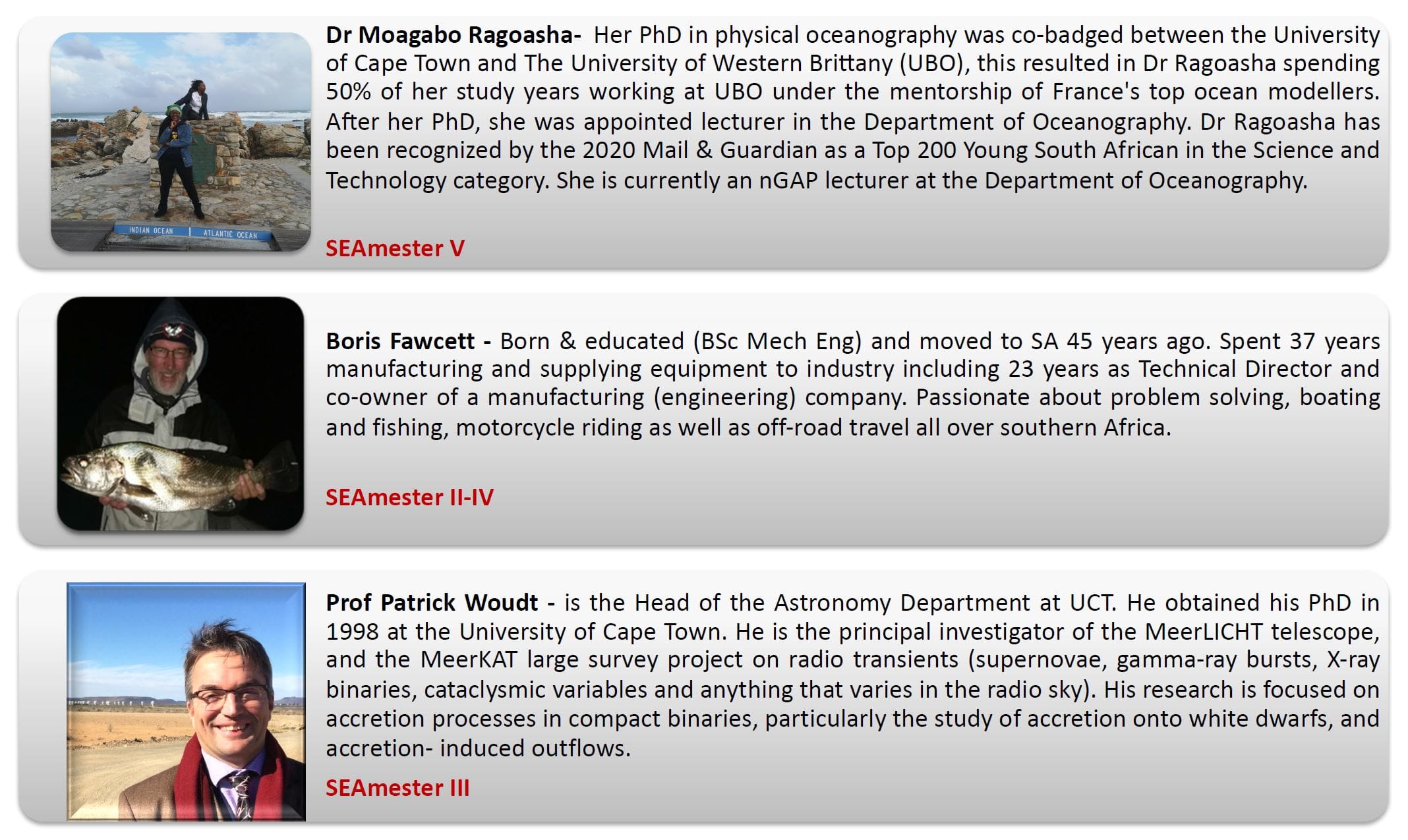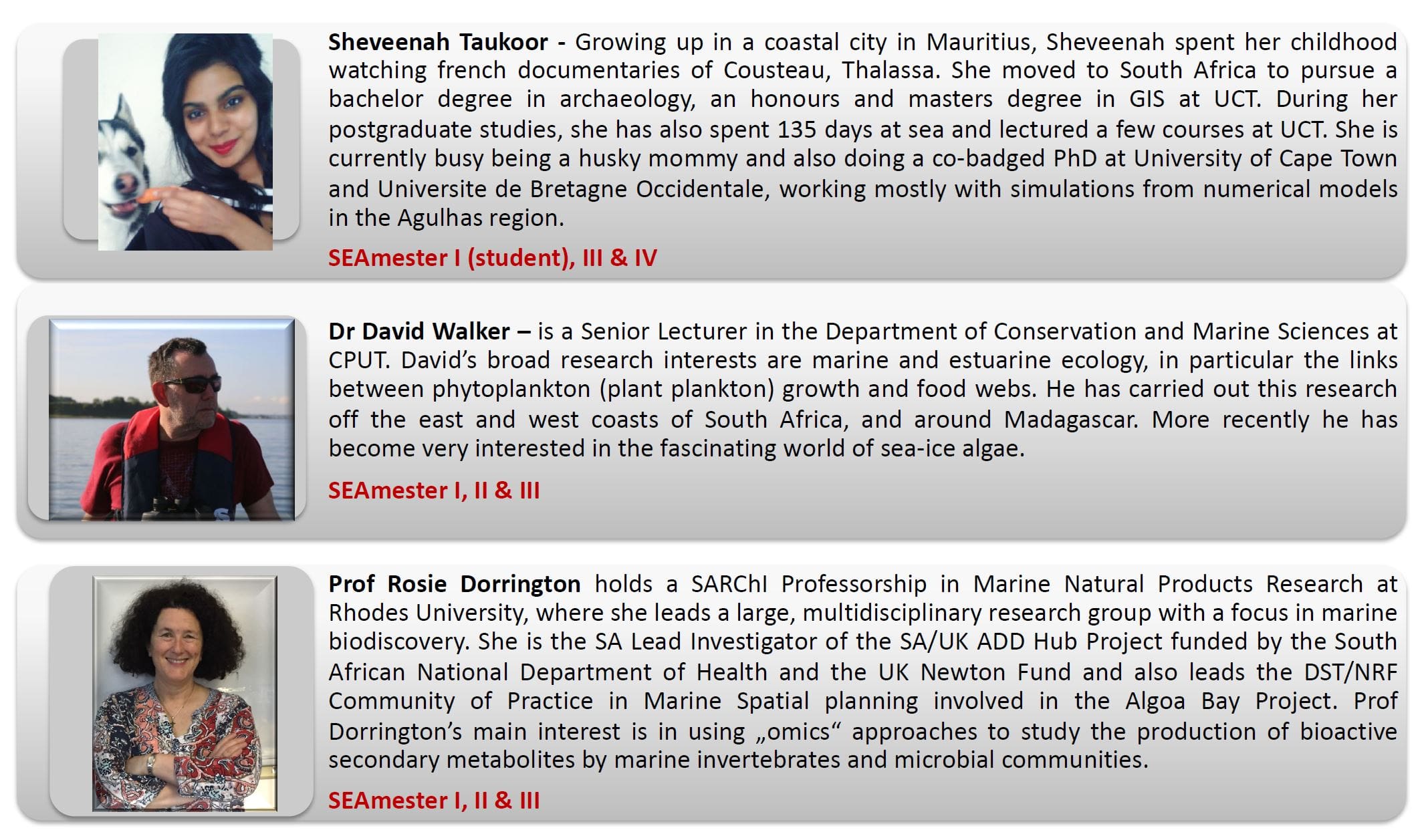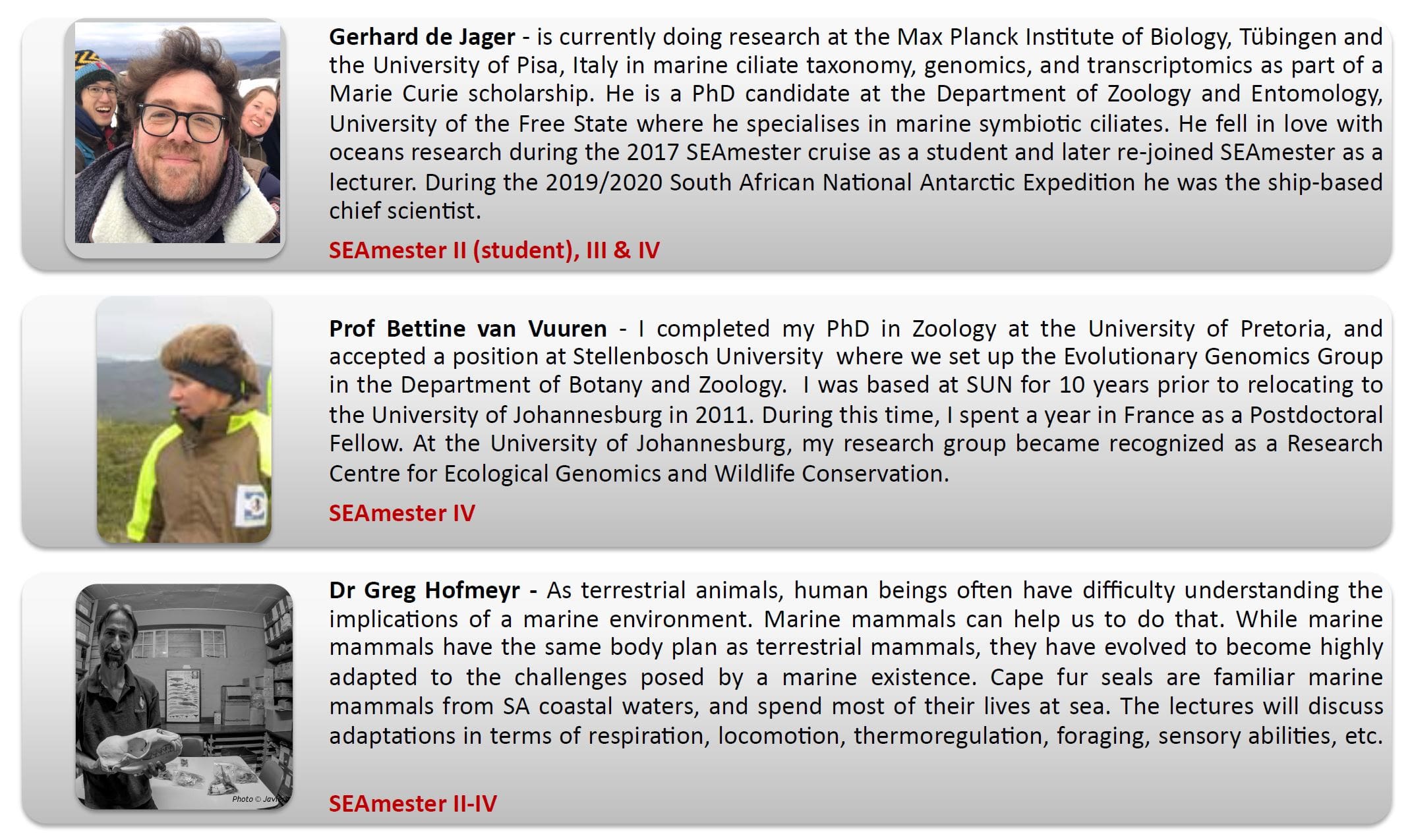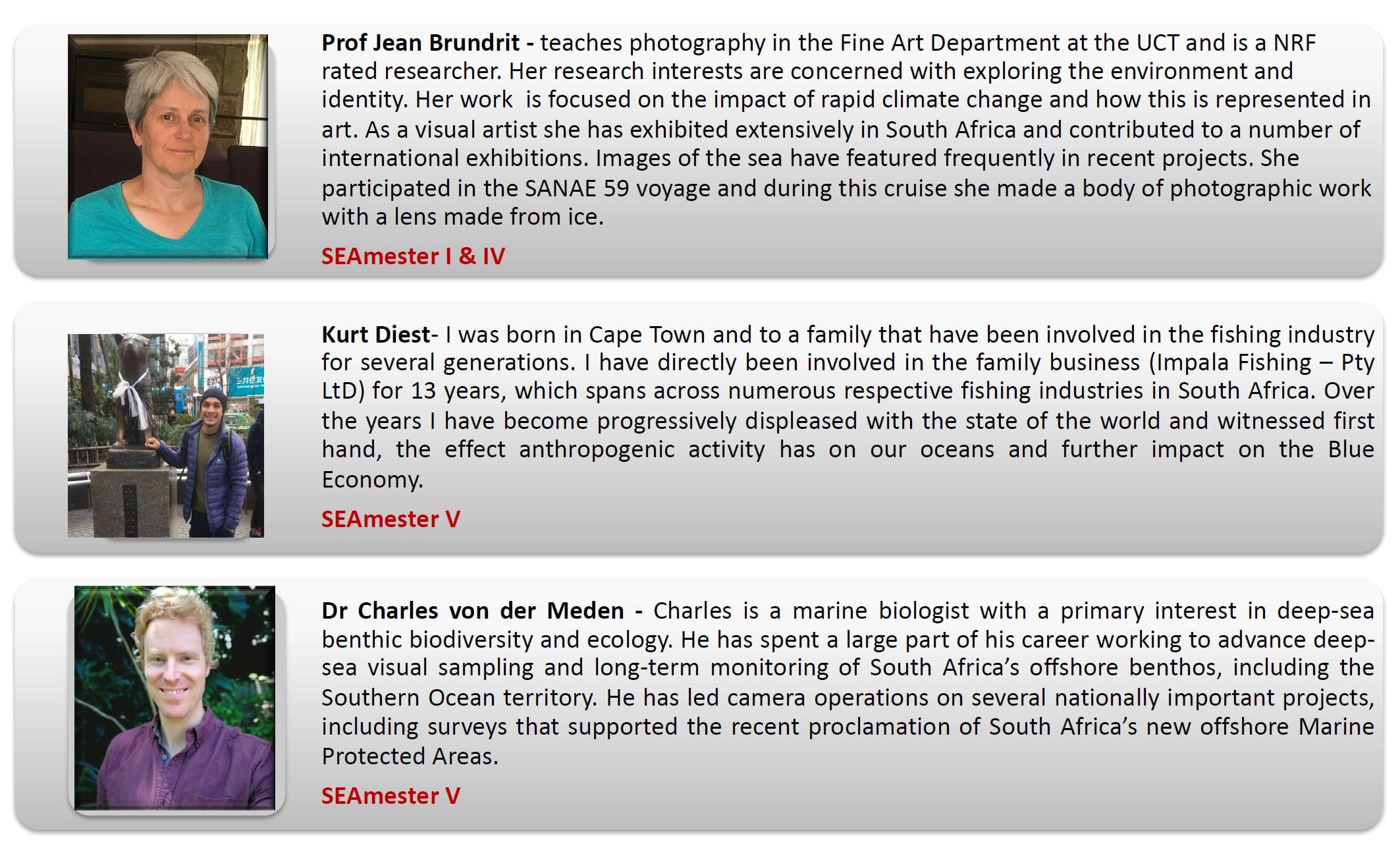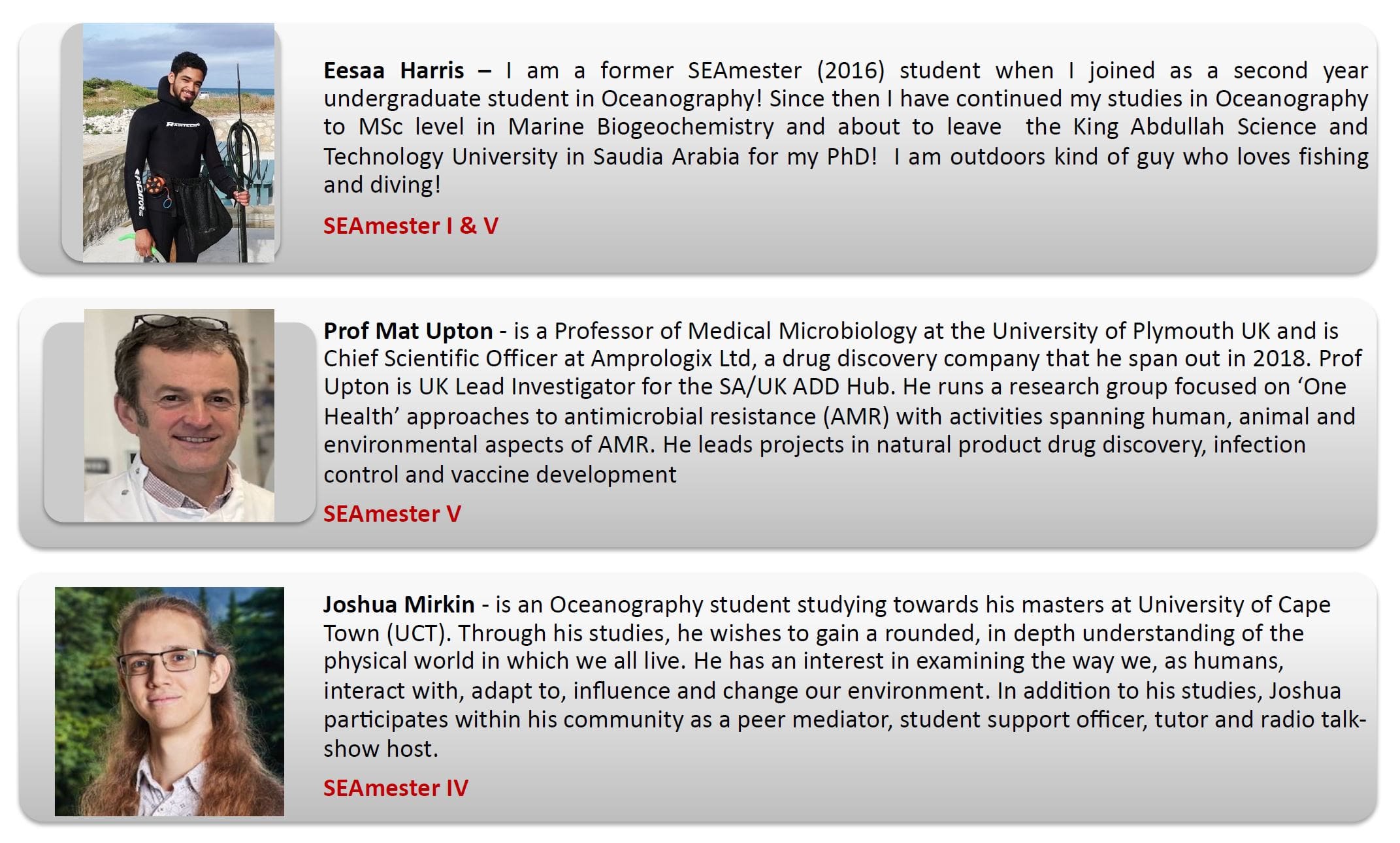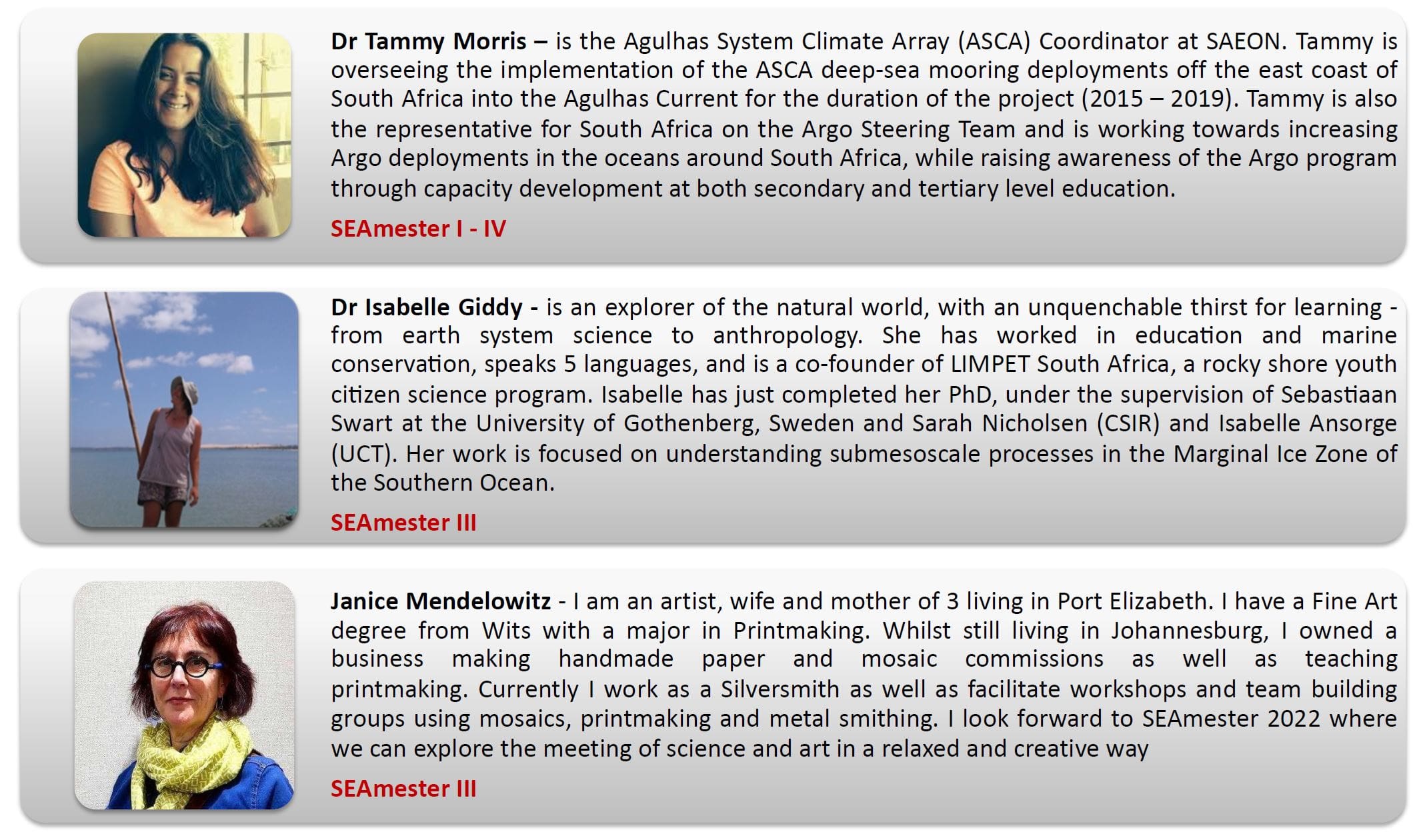
by Ria Olivier | Jul 21, 2022 | Research, SA Agulhas II, Science, SEAmester, Southern Ocean
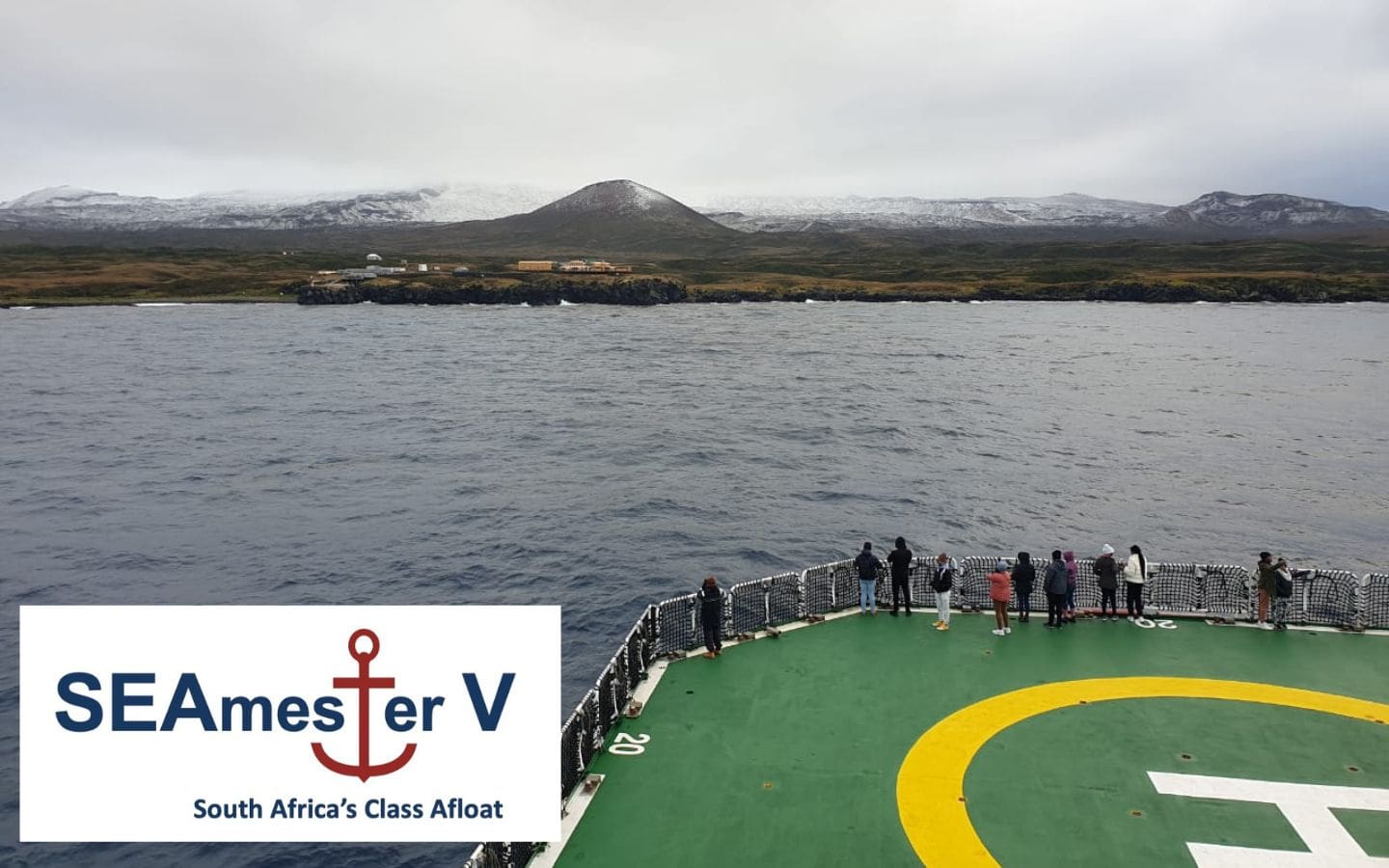
SEAmester – South Africa’s Class Afloat was started by Prof Isabelle Ansorge, Head of Oceanography, UCT in 2016 and coordinated by Tahlia Henry.
The program was birthed in the wake of formerly known as DST’s, Global Grand Challenge was issued to explore platforms that “attract young researchers to the region and retain them by exciting their interest in aspects of global change; while developing their capacity and professional skills in the relevant fields of investigation”. SEAmester has fulfilled this challenge with a program designed to bring together South African postgraduate students, within the marine sciences from over 19+ universities to participate in a multi-disciplinary learning cruise aboard flagship research vessel, the S.A. Agulhas II.
After a long 2-year long hiatus of the SEAmester program, due to the COVID-19 pandemic, SEAmester made a valiant return this year setting sail on the 27th of June – the 8th of July 2022.
A number of eager students applied this year but only 37 were selected and divided into two separate streams, namely “Tools of the Trade” and “Oceans in a Changing Climate”. Each stream caters to the vast world of marine science, with “Tools of the Trade” focussing on instrumentation/physical oceanography and the “Oceans in a Changing Climate” focusing on biological/chemical oceanography. Each stream has a dedicated team of lecturers on board who deliver comprehensive lectures and talks followed by hands-on deck work and practicals on a daily basis. A third stream is offered to all students which is the “Art” stream, this allows students to be creative in tasks such as tiled mosaics, photography, and documenting their cruise through film-making.
Meet the Students Meet the Lecturers
Students are also able to interact and work alongside a team of scientists onboard performing research along a monitoring line – ASCA (Agulhas System Climate Array). This year, SEAmester took on a slightly different cruise plan with a detour to the sub-Antarctic Prince Edward Islands. The science objectives on board were altered to accommodate the detour and set to hunt down and sample an anti-cyclonic eddy forming off the Agulhas bank.
Students were exposed to exciting benthic dredge work, CTDs casts, and Argo Float deployments across the anti-cyclonic eddy. Aside from their science engagements on deck, students were tasked with a number of projects and practicals which they presented on towards the end of the voyage. Students were given a full schedule but the highlight of this voyage and the unexpected golden nugget was being able to see Marion Island in the heart of winter, an experience I’m sure most won’t forget.
This SEAmester voyage was challenging in many aspects however the rewards far out way any trials we faced. Being at sea has a plethora of challenges which one needs to overcome, even more so when a full schedule is adhered to. But we have no doubt that this year’s SEAmester students rose to these challenges and walked away with not only a wealth of knowledge but also learnt some key life lessons and made everlasting friendships. With that said the biggest success of SEAmester remains to be its ability to break down social, cultural, economical, and racial barriers between students and in doing so build the next generation of marine scientists.

SEAmester V Student testimonials
“SEAmester V exceeded all of our expectations! I am truly blessed to have been given the opportunity to learn from the scientists and gain hands-on experience on the decks of the SA Agulhas II. I will forever cherish the memories & friendships that were made :)” – Zaahid Khan, WITS
“What an opportunity! What a lifetime experience! I’m beyond grateful for the chance I got to be part of the SEAmester Cruise of 2022. I got to experience and appreciate life in the ocean for the first time, met wonderful new people, and got to engage with experts from various fields in the marine sciences. Plus the FOOD was Amazing lol. ” – Sitha Ntlokwana, FHU
“The breadth of exposure to the different realms within marine research that SEAmester offered was truly extraordinary! From tiny parasites, to benthic diversity, to large scale climatic patterns, and everything in between. The hands on learning approach and type of sampling that we got to be apart of surpassed my every expectation. SEAmester was truly one of the most unique and exceptional experiences of my life. “ – Bianca Ferreira, WITS
“Being a part of the SEAmester cruise has been a once in a lifetime adventure, I am profoundly grateful for being granted the opportunity. I have gained insightful knowledge and expertise of oceanography that I will apply in my studies. The memories made with the scientists I met will forever be in my heart and I’m glad that I can now call them my friends.♥️” – Faith Mshiywa, FHU
“SEAmester was, for me, the best introduction to a research vessel. The experience broadened my view on what opportunities are available in my field and it was great to spend almost two weeks with like-minded scientists. On top of everything we were treated with the view of Marion Island.” – Michelle Hamman, NWU
Tahlia Henry, Antarctic Legacy of South Africa, 21 July 2022
Cover photo and article photos: Tahlia Henry.

by Ria Olivier | Jul 20, 2022 | Antarctica, Current Event, Environment, Research, SA Agulhas II, SA Polar Research Infrastructure, SANAP, SAPolarRI, Science, Southern Ocean, STEM

| TEAM | MERCURY & TRACE METALS |
| Project name | Knowledge and technology transfer to investigate marine mercury contamination |
| Principal Investigator 1 | Susanne Fietz | Stellenbosch University (SU) |
| Principal Investigator 2 | Lynwill Martin | South African Weather Service (SAWS) |
| Principal Investigator 3 | Lars-Eric Heimbuerger | CNRS-MIO |
Onboard MERCURY & TRACE METALS team members:

Front (L-R): Kayla, Lide, David, Sonja, Susanne; (back) Liam, Casper, and Jared.
| Team Member | Role | Affiliation |
| Susanne Fietz | PI and Onboard Team Leader | SU |
| Liam Quinlan | MSc | SU |
| Jared Walsh | MSc | SU |
| David Amptmeijer | PhD | GMOS, Europe |
| Sonja Gindorf | PhD | GMOS, Europe |
| Casper Labuschagne | MSc | SAWS |
| Kayla Buchanan | Honours | SU |
| Lide Janse van Vuuren | MSc | SU |
More about their research:
Mercury is a natural element and its biogeochemical cycle is heavily altered by anthropogenic activities. Over the past two decades, it became clear that processes in seawater are largely responsible for the conversion from inorganic mercury to the bioaccumulative neurotoxin methylmercury, which accumulates up marine food chains. This is of special concern as globally the main pathway of human exposure to methylmercury is via the consumption of seafood.
The #SCALEwin22 expedition is extremely valuable to better understand mercury dynamics in the Southern Ocean. Observations from this region are rare, especially observations during winter. Sonja and David are both doctoral students within the “Global Mercury Observation and Training Network in Support of the Minamata Convention”, a Marie-Curie training network involving several institutions all over Europe. Together with the TraceEx team from Stellenbosch University: Susanne (Senior Lecturer at the Department of Earth Sciences), Lide, Kayla, Caspar, Liam, and Jared, water and ice core samples will be taken, for mercury speciation and dissolved trace metals.
In the water and ice, we are sampling for oxygen and deuterium isotopes, different dissolved organic matter parameters, and persistent organic pollutants to relate mercury biogeochemistry to different anthropogenic and environmental factors. Moreover, we sample for genes that are relevant in mercury (de-)methylation (see purging process below).
All our samples and work onboard are following trace metal clean protocols. Trace metal sampling in itself is tricky! We take a wide range of measures to keep our samples uncontaminated: we wear protective gloves, sleeves, and coveralls, and all our work happens in a metal-clean container.
During this voyage, the project also aims to transfer important skills to improve our understanding of the mercury cycle to South Africa. This project thus trains young researchers, transfers analytical skills, and provides data for an improved understanding of mercury cycling.
More about the sampling:
Gaseous mercury will be measured in the atmosphere during the transect as well as total, dissolved gaseous, and methyl-mercury (see video and image below) in the ocean. In addition, we will sample frazil ice, unconsolidated and consolidated ice for the mercury content. The assessment of the mercury levels is accompanied by measurements of the phytoplankton and microbial community structure and also other trace metals in our collaborative work.
Scan this QR code below with your smartphone’s camera (or click on the image) to view the water sampling process.
VIDEO: CTD (Conductivity, Temperature, and Depth) deployment and recovery with GoFlo tubes. This is the process of collecting water samples at specific depths. After recovery, the water-filled GoFlo tubes are removed from the frame (filled with water collected from a specific depth) and moved to the trace metal testing clean lab.

Purging is the process of measuring methylmercury in water. In the image below, David (GMOS programme) and Casper (SAWS) are setting up for purging a methylmercury sample.

In this video: The purging process. One methylmercury species are outgassed and other species are left behind.
More Pictures

Text supplied by Susanne Fietz (PI and onboard team leader) and Sonja Gindorf. Images supplied by Susanne Fietz, Sonja Gindorf and Kurt Martin (SAPRI Trainee).
Featured Image: L-R: CTD recovery; postgrads working in the clean lab; Susanne carrying GoFlo tube to clean lab, after recovery; tubes being stored in the clean lab.
Anche Louw, Antarctic Legacy of South Africa, 20 July 2022

by Ria Olivier | Jul 15, 2022 | Current Event, News, Research, SA Agulhas II, SA Polar Research Infrastructure, SAPolarRI, Science, Southern Ocean, sub-Antarctic

| TEAM | FE |
| Project name | Seasonal iron speciation in the Southern Ocean |
| Principal Investigator 1 | Tommy Ryan-Keogh | Council for Scientific and Industrial Research (CSIR) |
| Principal Investigator 2 and onboard team leader | Thato Mtshali | Department of Forestry, Fisheries & the Environment (DFFE) |
Onboard FE team members:
| Team Member | Role | Affiliation |
| Thato Mtshali | Onboard Team Leader | DFFE |
| Natasha van Horsten | Postdoc | CSIR/UCT |
| Gareth Kiviets | Technician | DFFE |
| Gemma Portlock | PhD | University of Liverpool |
The project description as per the sailing orders for the SCALE Winter Cruise of 2022:
The overarching goal of the project is to improve our understanding of the natural complex biogeochemistry of iron in terms of sources, sinks and internal cycling on a seasonal scale in the Southern Ocean, in both the open ocean and naturally fertilised regions downstream of sub-Antarctic islands.
This morning, in the hangar of the RV S.A. Agulhas II, the South African Polar Research Infrastructure (SAPRI) trainees and the Mercury team got the opportunity to learn more about the sampling process used for all projects requiring extremely pure sampling conditions, such as the Fe-project. The experienced Dr Thato Mtshali explained how the CTD rosette is loaded with sampling bottles. The SAPRI trainees had the opportunity to assist in this process.
Images supplied by Susanne Fietz, PI and onboard team leader of the MERCURY team – to be introduced next.
Anche Louw, Antarctic Legacy of South Africa, 15 July 2022

by Ria Olivier | Jul 14, 2022 | Current Event, News, Research, SA Agulhas II, SA Polar Research Infrastructure, SANAP, SAPolarRI, Science, Southern Ocean, STEM

Through the South African Polar Research Infrastructure (SAPRI), the current SCALE-WIN22 (21-day) cruise, onboard the RV S.A. Agulhas II, is offering polar science training to 8 young individuals from South African universities not historically involved in polar sciences (or involved but in a small extent) or perhaps holding degrees not historically considered to be included in polar sciences.
They will get the opportunity to job-shadow members of the various research teams during onboard activities and get first-hand experience in polar sciences, by assisting with sampling. They will learn more about polar sciences through the onboard seminars delivered during the voyage.
Meet the 8 South African Polar Research Infrastructure (SAPRI) Trainees:
Pre-voyage logistics for the trainees were handled by the acting manager of SAPRI, Prof Juliet Hermes (Manager: South African Environmental Observation Network (SAEON) Egagasini node).
Read more about SCALEwin22 here!
Anche Louw, Antarctic Legacy of South Africa, 14 July 2022

by Ria Olivier | Jul 12, 2022 | Current Event, News, Oceanography, Research, SA Agulhas II, SA Polar Research Infrastructure, SANAP, SANAP Student, SAPolarRI, Science, Southern Ocean, STEM
SCALE (Southern oCean seAsonaL Experiment) Winter 2022 Expedition (SCALE-WIN22) onboard the RV S.A. Agulhas II

This dedicated science cruise is funded by the Department of Science and Innovation (DSI) and the National Research Foundation (NRF) in support of the scientific community involved in Southern Ocean projects (South African National Antarctic Programme – SANAP and other fundings). The South African Polar Research Infrastructure (SAPRI) and the Department of Forestry, Fisheries and the Environment (DFFE) facilitated the coordination of logistics.
This is a continuation of the SCALE coordinated effort (Southern oCean seAsonaL Experiment) proposed by the South African scientific community as a bottom-up experiment.
“SCALE-WIN22 will be a 21 days cruise of intensive sampling of the ocean-atmosphere- sea ice processes in the Antarctic polar zone. Multidisciplinary measurements of physical and biogeochemical properties of the ocean and sea ice will be performed in a set of process stations in the outer and inner MIZ”.
Departure: 11 July 2022
ETA back in Cape Town: 31 July 2022
Area of operation: The S.A. Agulhas II will operate from Cape Town to the Marginal Ice Zone (MIZ) along the Good Hope Line.

Provisional map of the track and stations.
Chief Scientists:
| Prof Marcello Vichi (UCT, on board) | Dr Sarah Fawcett (UCT, on land) |
 |  |
This cruise involves 13 national and 4 international research projects:
These projects will be introduced throughout the course of the cruise.
The number of passengers onboard:
84 passengers onboard the vessel. This number includes the 8 South African Polar Research Infrastructure (SAPRI) trainees.
National and international scientific institutions involved:
1. South African Polar Research Infrastructure (SAPRI) and South African Environmental Network (SAEON)
2. University of Cape Town (UCT)
3. Stellenbosch University (SU)
4. South African Weather Service (SAWS)
5. Cape Peninsula University of Technology (CPUT)
6. Council for Scientific and Industrial Research (Southern Ocean Carbon-Climate Observatory – SOCCO)
7. Department of Forestry, Fisheries and the Environment (DFFE)
8. University of Pretoria (UP)
9. Nelson Mandela University (NMU)
10. Representatives from the University of South Africa (UNISA), Rhodes University (RU), University of Kwa-Zulu Natal (UKZN), University of the Free State (UFS), Walter Sisulu University (WSU)
11. University of Gothenburg, Sweden
12. British Antarctic Survey, UK
13. University of Duisburg-Essen, Germany
14. The University of Melbourne, Australia
15. University of East Anglia, UK
16. Mediterranean Institute of Oceanography (MIO), France
17. CNR, Italy
18. University of Tasmania, Australian Antarctic Division, Australia
19. Aalto University, Finland
20. Finnish Meteorological Institute, Finland
21. SYKE, Finland
22. Alfred Wegener Institute, Germany
East Pier, Port of Cape Town. Cruise participants arriving from the quarantine facility. Only participants with negative Covid-19 test results will be allowed onboard.


The offical cruise hashtag to be followed: #SCALEwin2022
Anche Louw, Antarctic Legacy of South Africa, 12 July 2022

by Ria Olivier | Jul 7, 2022 | Announcement, Current Event, News, Research, SA Agulhas II, SANAP, Science, SEAmester, Southern Ocean, STEM, sub-Antarctic
South Africa’s 5th class afloat voyage, SEAmester V, is currently on the final leg home. On this last day on board the vessel, students are finishing up all deck work, and completing all projects and project presentations. There will be an art exhibition and farewell gathering later this evening.
This year, there were 21 lecturers involved in the SEAmester program.
Meet the lecturers of SEAmester V (2022)







